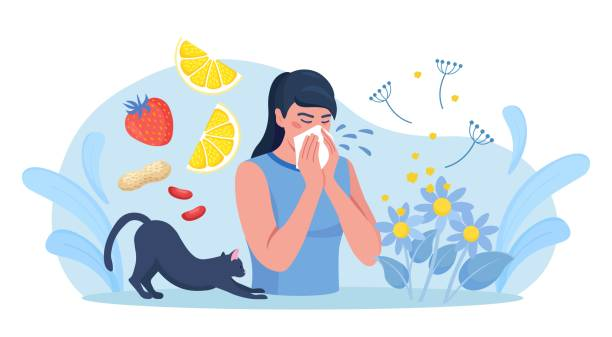Everything You Need to Know About Allergies: Causes, Symptoms, and Treatment
Allergies are an increasingly common health concern that affect millions of people worldwide. Whether it's seasonal pollen, pet dander, or food allergies, the body's immune system overreacting to substances that are typically harmless can cause a range of uncomfortable symptoms. Understanding what allergies are, their causes, how to recognize the symptoms, and how to manage them effectively can significantly improve the quality of life for those affected. In this article, we'll explore the basics of allergies, their causes, symptoms, and treatment options.

What Are Allergies?
An allergy occurs when the body's
immune system mistakenly identifies a harmless substance, such as pollen, dust,
or certain foods, as a harmful invader. The immune system then releases
chemicals like histamine to defend the body, causing allergic reactions. These
reactions can range from mild to severe and may affect various parts of the
body, including the skin, respiratory system, and digestive system. Common
allergic reactions include sneezing, itching, swelling, hives, and difficulty
breathing. While many people experience mild symptoms, others may have severe
reactions, such as anaphylaxis, which requires immediate medical attention.
This link https://www.manta.com/c/m1r5rpv/the-center-for-functional-medicine
Causes of Allergies
The exact cause of why some
people develop allergies and others don’t remains unclear, but several factors
contribute to the development of allergic reactions. Genetics play a
significant role—if one or both parents have allergies, their children are more
likely to develop them as well. Environmental factors are also critical;
exposure to allergens such as pollen, mold, pet dander, or certain foods can
trigger allergies. Additionally, air pollution, smoking, and other irritants
can increase the likelihood of developing respiratory allergies. In some cases,
the immune system becomes sensitized to an allergen after repeated exposure,
resulting in allergic reactions upon future encounters.
Common Allergy Symptoms
Allergic reactions can manifest
in a variety of ways, and the symptoms often depend on the type of allergy and
the area of the body affected. For respiratory allergies, such as those
triggered by pollen or dust mites, common symptoms include sneezing, nasal
congestion, runny nose, itchy eyes, and coughing. Skin allergies, such as those
caused by certain soaps or insect stings, may lead to redness, rashes, or
hives. Food allergies often cause swelling of the lips, mouth, or throat,
stomach cramps, or diarrhea. In some severe cases, allergies can lead to
anaphylaxis, a life-threatening reaction that causes difficulty breathing and
requires immediate emergency treatment. It's important to recognize these
symptoms and seek medical help if they escalate or become severe.
How to Manage and Treat Allergies
While allergies cannot be
completely cured, there are various treatments available to help manage symptoms
and improve quality of life. Over-the-counter antihistamines, decongestants,
and nasal sprays are often used to relieve mild allergy symptoms. For more
severe reactions, a doctor may prescribe stronger medications such as
corticosteroids or leukotriene inhibitors. Allergy shots, or immunotherapy, can
help desensitize the immune system to specific allergens, providing long-term
relief. In cases of food allergies, avoiding the allergen and carrying an
epinephrine auto-injector (EpiPen) for emergencies is crucial. For
environmental allergies, reducing exposure to triggers by keeping windows
closed, using air purifiers, and washing bedding frequently can help. Regular
consultations with an allergist are essential for identifying specific
allergens and developing an effective treatment plan tailored to your needs.
Preventing Allergic Reactions
Although it may not be possible
to completely prevent allergies, there are several steps you can take to
minimize your risk of allergic reactions. For seasonal allergies, avoid being
outdoors during peak pollen times, usually early in the morning or late in the
evening. Wearing protective clothing like hats and sunglasses can help reduce
exposure to allergens. For food allergies, always read labels carefully and
inform restaurants about your allergies when dining out. Keeping your home free
from allergens like pet dander and dust mites is crucial; regular cleaning and
using allergen-proof mattress covers can significantly reduce indoor allergens.
Maintaining a healthy immune system through a balanced diet, regular exercise,
and adequate sleep can also help prevent the severity of allergic reactions.